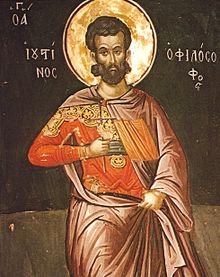
Back القديس جاستن Arabic القديس جاستن ARZ Əzabkeş Yustin Azerbaijani Юстын Мучанік Byelorussian Юстин (философ) Bulgarian Justí el Màrtir Catalan Justin Mučedník Czech Justinus Martyr Danish Justin der Märtyrer German Ιουστίνος ο Μάρτυρας Greek
This article contains too many or overly lengthy quotations. (January 2023) |
Justin Martyr | |
|---|---|
 15th-century icon of Justin Martyr by Theophanes the Cretan | |
| Theologian, Apologist, and Martyr | |
| Born | c. AD 100[1] Flavia Neapolis, Judaea, Roman Empire |
| Died | c. AD 165 Rome, Italia, Roman Empire |
| Venerated in | Catholic Church Eastern Orthodox Church Oriental Orthodoxy Lutheranism Anglicanism |
| Canonized | Pre-Congregation for the Causes of Saints |
| Feast | 1 June (Catholic Church, Eastern Orthodox Church, Lutheranism, Anglicanism) 14 April (Roman Calendar, 1882–1969) |
| Patronage | Philosophers[2] Philosophy career |
| Other names | Justin the Philosopher |
| Notable work | First Apology |
| Era | Ancient philosophy |
| School | Middle Platonism |
Main interests | Apologetics |
Notable ideas | |
|
Preview warning: Page using Template:Infobox philosopher with unknown parameter "influences" Preview warning: Page using Template:Infobox philosopher with unknown parameter "influenced" | |
| Part of a series on |
| Catholic philosophy |
|---|
   |
Justin, known posthumously as Justin Martyr (Greek: Ἰουστῖνος ὁ μάρτυς, romanized: Ioustinos ho martys; c. AD 100 – c. AD 165), also known as Justin the Philosopher, was an early Christian apologist and philosopher.
Most of his works are lost, but two apologies and a dialogue did survive. The First Apology, his most well-known text, passionately defends the morality of the Christian life, and provides various ethical and philosophical arguments to convince the Roman emperor, Antoninus, to abandon the persecution of the Church. Further, he also indicates, as St. Augustine would later, regarding the "true religion" that predated Christianity,[5] that the "seeds of Christianity" (manifestations of the Logos acting in history) actually predated Christ's incarnation. This notion allows him to claim many historical Greek philosophers (including Socrates and Plato), in whose works he was well studied, as unknowing Christians.
Justin was martyred, along with some of his students, and is venerated as a saint by the Catholic Church,[6] the Eastern Orthodox Church,[7] the Oriental Orthodox Churches, Lutheran Churches, and in Anglicanism.[8]
- ^ Thomas Whitlaw, Commentary on John (1885), p. xl
- ^ St. Justin Martyr, patron of philosophers, honored on June 1
- ^ McNally, Terrence J. (2009). What Every Catholic Should Know about Mary. Xlibris Corporation. p. 185. ISBN 978-1-4415-1051-8.
- ^ Iliara LE Ramelli. (2016). Social Justice and the Legitimacy of Slavery: The Role of Philosophical Asceticism from Ancient Judaism to Late Antiquity. 53 pp.
- ^ "The very thing which is now called the Christian religion existed among the ancients also, nor was it wanting from the inception of the human race until the coming of Christ in the flesh, at which point the true religion which was already in existence began to be called Christian." – St. Augustine, Retractiones
- ^ Cite error: The named reference
Catholicwas invoked but never defined (see the help page). - ^ "Justin the Philosopher & Martyr and his Companions". Retrieved 2 April 2011.
- ^ "For All the Saints" (PDF). Archived from the original (PDF) on 24 May 2010. Retrieved 8 November 2012.
© MMXXIII Rich X Search. We shall prevail. All rights reserved. Rich X Search